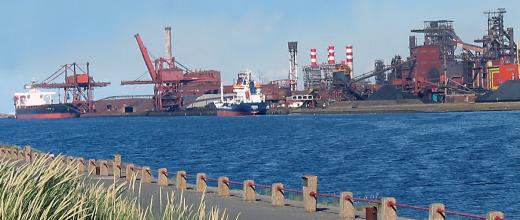08.03.2022
3 minutes of reading
Achieving the goals set out in the United Nations’ “2030 Agenda for Sustainable Development” will require gender equality in the field of science. This message underpinning the International Day of Women and Girls in Science is shared by IFPEN via its policy of equality and openness. On Friday 11 February this year, IFPEN spoke to Vania Santos-Moreau, one of its research engineers and 3D project manager in the field of CO2 capture, utilization and storage (CCUS).
Why this profession? What made you choose science?
It all goes back to my childhood: I grew up in a tiny village in Portugal and there were no female role models to look up to in the field of science. I wanted to leave my environment and achieve extraordinary things, but I didn’t know what job I wanted to do.
When the time came for careers choices to be made, I met a woman who made a huge impression on me. She was the region’s first female chemical engineer and she told me all about her experience in the field of chemistry and processes. Her motivation and enthusiasm inspired me to wonder: “Why not me?” So after I left high school in Portugal, I went on to study chemistry.
Over time I realized that it wasn’t just chemistry itself that appealed to me but the way it can be applied to achieve a specific objective. I get a real kick out of seeing a project emerge and building a team to take it forward.
What does it mean to you to be a “woman of science”? How do you see the role of women in your sector?
Much has been done to increase the number of women in companies and to give them access to positions of responsibility: this is to be commended, but also needs to be continued. As a woman in a project management role I still come up against obstacles. Hence the importance of assuming the role fully and remaining true to oneself. Women should not hesitate to apply a working method that reflects their deeply held convictions.
As 3D project manager, for example, my priority concerns the well-being of the women and men within my team. My management approach values teamwork based on sincerity, empathy, team empowerment and humility with respect to an individual’s role within the project. The approach is highly effective, and I’m convinced it will produce some amazing results.
The “3D” project in a few figures
European H2020 project
Objective: to demonstrate an innovative process for CO2 capture of industrial origin, DMX™
Budget of €19.3 million over 4 years, including €14.8 million in the form of European Union subsidies
11 partners
118 women and 157 men
You took part in the “Women in CCUS” workshop as part of the C4U project: what did you take from this experience and meeting other women in the sector?
The workshop was extremely valuable to me because it was an opportunity to talk to female colleagues - scientists and non-scientists - working on a variety of projects around the world in the field of CCUS. I was able to compare my experiences with those of older women in the sector, who encouraged me to cast aside my doubts about my abilities as a leader and to take my place, regardless of the sexist behaviors (jokes, mansplaining*, etc.) that are still a reality in today’s workplace.
The workshop was also an opportunity for me to shine a light on the role of women working on the 3D project, from both research and functional divisions, and strengthen our bond. I could see that they were particularly pleased that the role they had played had counted for something and could serve as an example.
*Neologism invented to describe an attitude whereby a man explains something to a woman that she already knows, sometimes in a field in which she is an expert.
What advice would you give to girls and young women today?
The first piece of advice I give to my daughter concerns school: do your best so that you have no regrets! The education system shapes our path and gives us the opportunities we need to choose the life we want. The second piece of advice concerns the right to get it wrong: it’s perfectly OK to set off down one particular road and then change your mind if you feel it’s not for you.
I also think it’s important to be willing to leave behind the familiar, your parents, and your native region in order to grasp opportunities elsewhere. University research can also be extremely rewarding in terms of knowledge and meeting others, but more generally it is important to experiment, to remain curious about life.
Whatever else, I will end by telling them that science is a wonderful field when you want to make things happen. The choice of specialty depends on our individual preferences, but there is no doubt that science is an immensely satisfying field!







